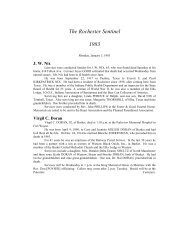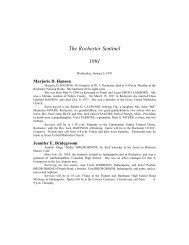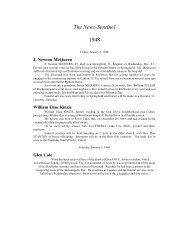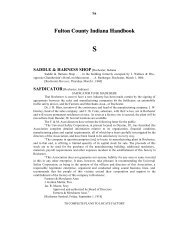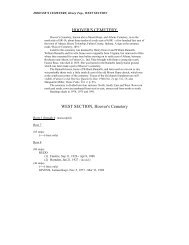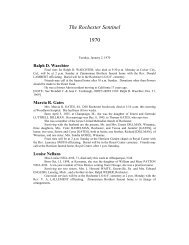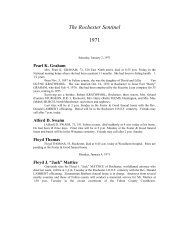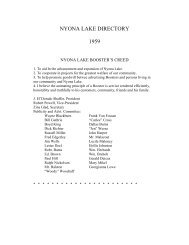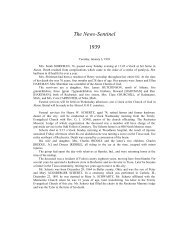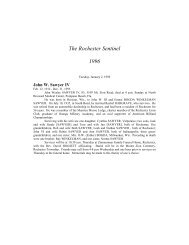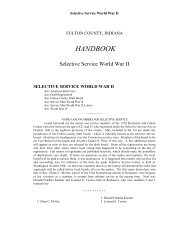Handbook N-P - Fulton County Public Library
Handbook N-P - Fulton County Public Library
Handbook N-P - Fulton County Public Library
You also want an ePaper? Increase the reach of your titles
YUMPU automatically turns print PDFs into web optimized ePapers that Google loves.
Po<br />
Notice of order of sale by Cass Circuit Court, apprais ed $10,085, belonging to Jessie<br />
Taber.<br />
[[ibid Saturday, March 24, 1877]<br />
At last the Pottawattamie flouring mill property has come into the possession of our<br />
townsmen. It was formerly owned by the Smiths and Tabers, of Logansport, but last week the<br />
enterprising firm of Elliott, Leiter & Hickman purchased it for the modest sum of twelve thousand<br />
dollars<br />
[ibid, Saturday, September 15, 1877]<br />
Sale of Mill Property. The Pottowattomie Mill property has been purchased for the sum<br />
of $20,000 by parties residing in Kosciusko and Huntington counties.<br />
[Rochester Union-Spy, Thursday, October 29, 1868]<br />
[NOTE: Listed as William J. Leiter, Erie elevator, 185 Main, in Directory of Rochester,<br />
Ind., 1907.]<br />
Presently owned by <strong>Fulton</strong>-Marshall Co-op.<br />
See Hickman & Leiter.<br />
POTAWATOMI TREATY OF 1826<br />
The tribe of Indians inhabiting <strong>Fulton</strong> <strong>County</strong> when the white men arrived was known as<br />
Potawatomi. They were a division of the larger tribe of Algonquins, but had separated themselves<br />
on the southern shores of Lake Michigan. The name “Potawatomi” means “Keepers of the fire.”<br />
The first treaty that directly affected <strong>Fulton</strong> <strong>County</strong> was concluded October 16, 1826, at<br />
Wabash at the mouth of the Mississinewa. This treaty ceded much Potawatomi land north of the<br />
Wabash River to the U.S. government and ceded a strip of land 100 feet wide from Lake Michigan<br />
to the Wabash River for a road.<br />
The treaty obligated the United States as follows: In consideration of the cessations of<br />
land, the U.S. agreed to pay to the Potawatomi tribe $2,000 in silver for 20 years, to appropriate<br />
$2,000 a year for their education, to provide and support a blacksmith for them at some convenient<br />
spot, to build them a mill for grinding corn, to provide and support a miller, and to pay them<br />
annually 160 bushels of salt.These were to be paid by the Indian agent at Fort Wayne, General<br />
John Tipton.<br />
[Potawatomi Treaty of 1826, Shirley Willard, <strong>Fulton</strong> Co Folks, Vol. 2, Willard]<br />
POTAWATOMI TREATY OF 1836<br />
The villate of Chippewanong, about a mile east of the Old US-31 bridge on the<br />
Tippecanoe River, was the site of several more treaties in March, April and September, 1836. As a<br />
result all the Potawatomi territory from Chicago to the Tippecanoe River was ceded to the United<br />
States, and the Indians were to be moved to lands west of the Mississippi River. To persuade the<br />
Indians to accept the treaties, liberal amounts of whiskey were frequently used.<br />
Payment for the land was in gold or silver, brought by wagon from Fort Wayne and<br />
distributed by the Indian Agent, Abel C. Pepper. There was a riot during the payment of<br />
September 25, 1836, at Chippewanong. The treaty was concluded September 23 and $63,000 in<br />
gold arrived two days later to pay the Indians for the land they had ceded.<br />
But two white traders, Ewing and Tabor, who operated a trading post at Chipeway (where<br />
old US-31 crosses the Tippecanoe), claimed that the Indians owed them $24,000. There were<br />
several other claimants too, and violence broke out among the white men. Col. Pepper called all<br />
the money back in, but $14,000 could not be found. The money was redistributed, and in the end<br />
the Indians got only $16,000 out of the $63,000.<br />
Even this amount the Indians did not keep long, as the white men sold him fire-water, and<br />
while he was drunk, took the gold from his box and filled it with sand. Or he sold the Indian a<br />
blanket and then stole it back while the Indian was drunk and sold it to him again and again.




